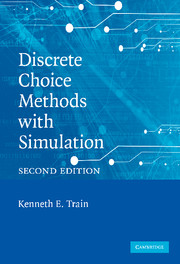4 - GEV
Published online by Cambridge University Press: 05 June 2012
Summary
Introduction
The standard logit model exhibits independence from irrelevant alternatives (IIA), which implies proportional substitution across alternatives. As we discussed in Chapter 3, this property can be seen either as a restriction imposed by the model or as the natural outcome of a well-specified model that captures all sources of correlation over alternatives into representative utility, so that only white noise remains. Often the researcher is unable to capture all sources of correlation explicitly, so that the unobserved portions of utility are correlated and IIA does not hold. In these cases, a more general model than standard logit is needed.
Generalized extreme value (GEV) models constitute a large class of models that exhibit a variety of substitution patterns. The unifying attribute of these models is that the unobserved portions of utility for all alternatives are jointly distributed as a generalized extreme value. This distribution allows for correlations over alternatives and, as its name implies, is a generalization of the univariate extreme value distribution that is used for standard logit models. When all correlations are zero, the GEV distribution becomes the product of independent extreme value distributions and the GEV model becomes standard logit. The class therefore includes logit but also includes a variety of other models. Hypothesis tests on the correlations within a GEV model can be used to examine whether the correlations are zero, which is equivalent to testing whether standard logit provides an accurate representation of the substitution patterns.
- Type
- Chapter
- Information
- Discrete Choice Methods with Simulation , pp. 76 - 96Publisher: Cambridge University PressPrint publication year: 2009



